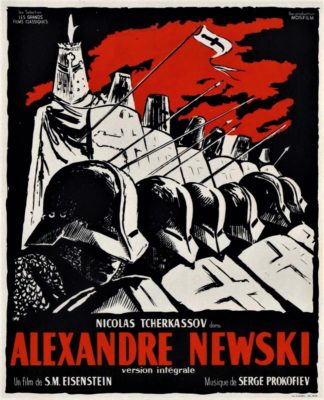Paintings are dead. The oleaginous purples of baroque: dead. The petal-like brushstrokes of impressionism: dead. The apotheotic ecstasies of romanticism: dead beyond dead. Even when they evoke or suggest life they aren’t life, and if you try to breathe the unending skyful of air in Caspar David Friedrich’s Monk by the Sea you will suffocate and also become dead.
Airless Spaces (from 1998) is about that kind of dying: trying to sustain yourself on artifice and illusion. It’s short – about a hundred and fifty pages – and very readable, containing fifty vignettes drawn from the author’s experiences in mental hospitals.
Shulamith bath Shmuel ben Ari Feuerstein was an early radical feminist. Her 1970 book The Dialectic of Sex launched her to fame, and it seemed like she was set for the same sort of life Greer, Friedan, and Steinem had – forty or fifty years of teaching, consciousness-raising, fighting the patriarchy a little, fighting other feminists a lot, and the occasional bra-burning publicity stunt to remain in the public eye.
Incredibly, the book marked the end of Shulie’s career. She disappeared from public view in 1971 – to pursue a career as a painter, she said. In actuality, a shadow had fallen on her, and her struggles with schizophrenia (worsened by the death of her father and the apparent suicide of her brother) caused her to be repeatedly institutionalized. Although I don’t think her name even appears in the book, Airless Space is her account of those 28 missing years.
It describes places that aren’t real places, relationships that aren’t real relationships, and words that have no meaning. Like paintings, these artifices vary in their details. Some are crude and clumsy. Others are painted with a maestro’s touch, and cleverly deceive you into thinking they’re real. But they’re all pitiful facsimiles of the real thing, and none of them are of much use at sustaining life. Like eating an apple made of wax.
There’s no theory or politicizing, instead there’s endless and fascinating detail about daily life in the land of the mad. Time is absent from the book (most stories could take place anywhere from 1971 to 1998, with only a few being dated by details like VCR and email), yet also omnipresent. The hours crawl like a broken-backed cockroach. Eventually you stop even feeling bored: you just stare slackmouthed at the clock as it sweeps from breakfast time to lunch time to dinner time to bed time.
Society doesn’t deal with insanity that well in 1998 or any other year. In most of the stories Shulie could be at a prison; she encounters rigid and unbending bureaucracy, orderlies who apparently moonlight as nightclub bouncers, and institution-fostered drug dependencies. The chapter titles alone are grim. The Forced Shower. The Prayer Contest. Bedtime is the Best Time of the Day. Bloodwork. The Sleep Room. Incontinence. The Jump Suit. Hating the Hospital. Suicides I Have Known.
There’s a section simply titled losers. The term sounds sophomorically cruel, like what a bully would say as he gives you a bogwashing, but it’s an accurate description. The people Shulie writes about have lost. There’s no other way to put it. You feel pity reading about some of them.
- Ana, a vain woman who has managed to sneak in a stylish white jogging suit. She wears it along with a face of stolen makeup, lording over the other patients “like a queen in haute couture”. Inside, she’s unimaginably glamorous. When she’s released, she looks exactly like what she is: a person sprung from a mental ward.
- Jane, a “small and ugly” punk rocker who spends her entire day on the phone, trying to get out. One morning at breakfast, each patient receives a banana, and Shulie is missed. She sees Jane not eating hers, asks if she can have it. Jane has an explosive psychotic episode, spitting in Shulie’s face while screaming an “incomprehensible torrent of abuse”. She spents the rest of her stay trying to have Shulie arrested.
- Ellin, an intelligent, cheerful, and apparently sane woman committed for hypochondria. None of the doctors believe her to be sick. Her brother suing for ownership of her property, on the basis that she’s crazy (as proven by the fact she’s in an institution). She’s spending all of her savings on lawyers to fight him and will soon be penniless. Later, Shulie learns that the brother won, and Ellin was evicted from her own apartment. She never learns what happened to her after that.
- An anonymous woman (who might be Shulie herself) hears about someone dying one day, and wishes she could trade bodies with that person. They would get a healthy body with many more years of life. She would get a dead one with no more years. This seems optimal for both of them.
- Stanley, an old friend of Shulie. He’s perennially broke ex-academic who has spent nearly every spare moment of the past eight years working on a thousand-page long magnum opus on philosophy. He submits it to a press owned by a “prominent former radical”. It’s rejected, on the basis that it’s unreadable and also they don’t do philosophy. He has no idea what else to do with it.
And so on. Along the way, Shulie gives advice on how to get out of a psych ward. Behave. Attend all activities religiously. But don’t allow yourself to become invisible, or you’ll be forgotten. Rock the boat in small ways. Stand out. Wear an interesting item of clothing if allowed. Put effort into your appearance. Pace the halls, so people can’t escape the fact that you’re there. Learn the names of all the doctors and orderlies and have interactions with them – even if it’s just saying “hello” in the hallway, and even if you’re ignored. The basic idea is to be present. There’s a world of difference between a person in an institution (who doesn’t belong), and an institutionalized person (who belongs very well), and your job is clearly be the former, so you can hopefully get out.
But out is in misspelled for a lot of people. Another sad aspect of Airless Space is that many of these people will live awful lives no matter where they are: they’re poor, crippled, will never be “better” in any meaningful sense, and their insanity is a response to circumstance (“Just because you’re paranoid, does not mean they’re not out to get you”). I’m struck by the story of Mrs Brophy, who views her prolongued hospital stays as a vacation from the nerve-shredding job of caring for her large household with many children. Another repeat in-and-outer adapts to the point of being nonfunctional in the real world. “Every time she went in, especially after the first, she felt submerged, as if someone were holding her under water for months. When she came out she was fat, helpless, unable to make the smallest decision, speechless, and thoroughly programmed by the rigid hospital routine, so that even her stomach grumbled on time, at precisely 5 p.m.”
There are some humorous touches. There’s a plane trip where Shulie complains about the in-flight movie “Melanie“, which she calls a “pre-adolescent fantasty with a decidedly lesbian tinge”. Shulie should have been a film critic. There’s also an interesting meeting where she meets none other than Valerie Solanas, whose later life makes Shulie’s look like a success story. Solanas has read The Dialectic of Sex and hates it, and starts arguing with Shulie about it. The low comedy of two destitute madwomen debating the theory of a world that rejected them decades ago isn’t lost on her.
In short, very interesting, very sad, very effective. This ain’t it, chief became Twitter’s favorite put-down for a while, and that’s what this book is: this ain’t it fifty times in a row. I don’t know that I’ll ever re-read Airless Spaces, but it made an impression. The book opens on one of its most memorable image: you’re aboard a sinking ship…but that ship is inside the Bemuda Triangle. If you’re dying in a place that’s false and unreal, are you really dying? Whatever the answer, you’re clearly not living.
No Comments »
I think about this image a lot.
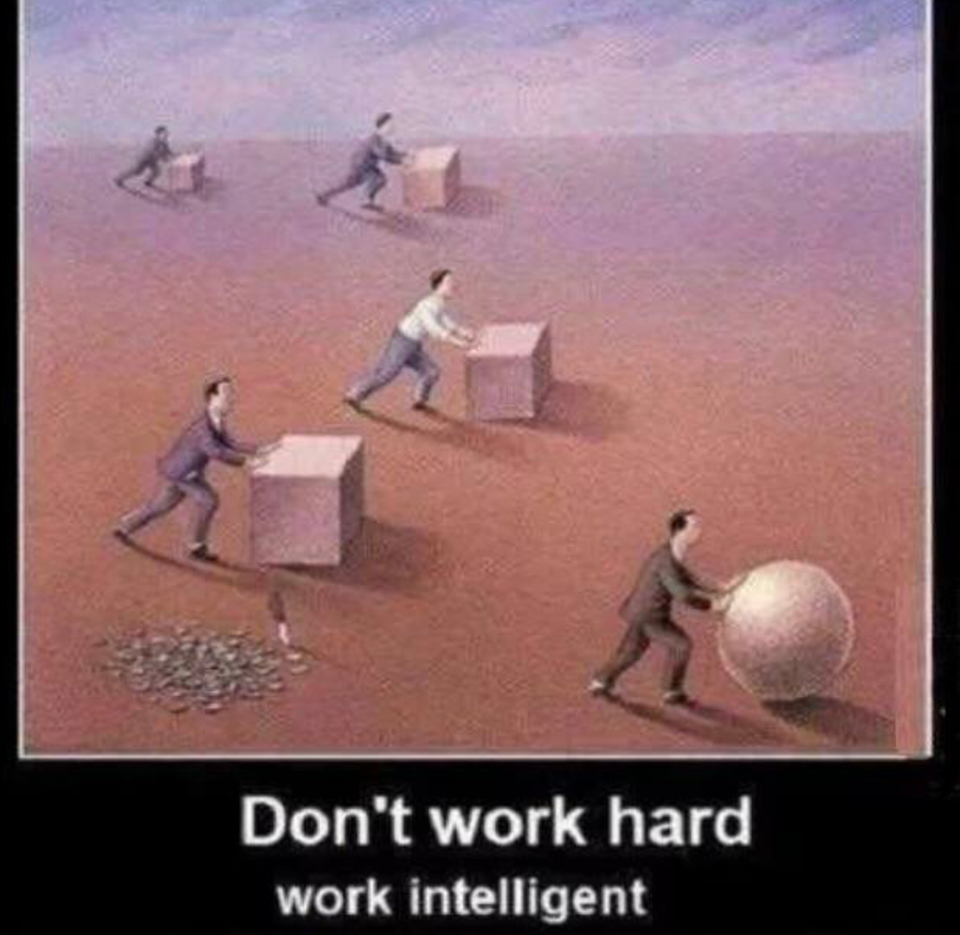
What’s the purpose of the cubes? If they’re blocks in a building, the “intelligent” worker has made his cube useless. He’s going to look like a dumbass when he arrives at the construction site and they say “wow, look at the huge brain on you. We can’t use it. It’s useless.” He should have carved his cube into a cylinder. That way he can roll it on his side, but it can still be used as a load-bearing element.
Speaking of cylinders, and rolling, and uselessness…

It’s my latest acquisition: a PC case from the wilderness of AliExpress.
This case is advertised around the internet under a half-dozen different names: the GAMEKM Spirit, the GAMEKM Genki Bomb, the TGEARS GAMEKM Genki Bomb Cyclops, the Space Capsule, the JF-TVQJ, and a different company called Vetroo sells an unbranded variant called the V2. I don’t know if they have the rights to the design or if heft-spelled-with-a-t is going on.
It’s clearly intended for Asian teenagers who want a cool-looking PC that doesn’t take up space. Other companies have repeatedly failed to bring cylindrical case designs to market, mostly because they made your computer look like a literal trash can. The GAMEKM SpiritGenkiBombCyclopsJFCapsuleV2 is a different story: it sits on its side (supported by two sled mounts), and its 180 degree acrylic panel (and a 200mm front-mounted fan) encourage you to stuff it with RGB rainbow puke.
This case would be right at home at a Chinese wangba or Korean PC bang: GAMEKM/Vetroo should have made a prebuilt with the latest cheats, hacks, and scripts installed. Do I have to come up with all the good ideas around here?
I didn’t add the “Amazing !!!!!” and “666666”s and so forth, those were on the marketing copy, which is full of lies.
– there is no tempered glass on the case. All transparent elements are acrylic sheet.
– There is no way in fuck you will fit a 165mm CPU cooler in this case. There might be that much internal clearance with a motherboard and CPU installed, but the top of the case is curved. If your cooler is 120mm wide, its height must be approximately √(315^2-120^2)/2 = 145.5mm to fit Remember that you also need fans.
– it ships with a 200mm fan, but it can’t be connected to AuraSync, RGB fusion, and so on. It’s two pin Molex.
– A fan mounted in the position would draw air in to the case, not expel it as the arrows indicate.
– “vertical installation” of the GPU: technically true, but only because your motherboard is flat. You literally just put your GPU in the way you normally would. There’s no other way to install it and I have no idea why they advertised this like it’s a special feature.
– I hope “450*3158*350mm” is a mistake.
– “This little guy can make you a star in your circle of friends”. Very questionable.
It’s “fruity and small”, though. I’ll give them that.
Anyway, let’s build.
* * *
PC builds have a way of going to hell. I can’t count the times my “this will take 2 hours and then I’ll be done” plan has become “this took 8 hours and there’s a gun in my mouth”. This was one of those times.
(Images can be expanded by clicking on them)

My parts were:
- Gigabyte B550M Aorus Elite AM4 mATX Motherboard
- Ryzen 5 3600 CPU
- AMD Radeon RX 570 (cringe)
- MSI MAG CoreLiquid 240R AIO
- 500GB Samsung 970 NVME m.2 drive
- 2×16 3600MHz GSkill DDR4
- Super Flower modular PSU, not sure on wattage
- 6x Thermaltake Riing Trio 120mm fans
- 1x Thermaltake Riing Trio 200mm fan (replacing the stock GAMEKM fan)
Things started well. I removed the acrylic panel and the two sleds, installed the modular power supply, and routed the cables through the grommets. I’m trying to get things as close to their final configuration as possible – my 24 pin exits near my motherboard’s power socket, and my EPS and VGA connectors terminate near my CPU and GPU power. There are things that are easy when you have an empty case but nearly impossible when the case is full.

I also replaced the 200mm fan, which did not spark joy, with a superior Thermaltake Riing Trio 20. I needed motherboard connectivity. Also, I liked the outer circle on the Riing model fans. They also have a light diffuser bar that smears out the LED hotspots, avoiding the annoying “Christmas lights” effect of many cheap RGB fans.
The chassis is made of SPCC cold-rolled steel. It feels good to touch. There’s something about the tactility of curved metal that goes away when you have straight lines.

Next I installed the motherboard, and then the NVME drive (many of these components, by the way, came from a previous PC.) Wanna know an ancient Chinese secret? Only screw in one of your motherboard standoff screws while you’re working on it. That way your motherboard can bend and flex, allowing you to thread small cables underneath it.
My original intent was to water cool the PC. As the ad copy observes in bastard English, the top of the case supports “cold rows” (liquid cooling, presumably) of 240mm in length. By chance, I had a 240mm radiator I wasn’t using. I had a brilliant idea. I would put two 120mm TT Riing fans on both sides of the radiator block, in push-pull configuration, and mount the entire thing to the top. I’d never seen anyone do anything like that before. I’d make a radiator sandwich!

However, often there’s a reason why nobody’s done something before. Immediately, I ran into three problems. The TT Riing Trio fans are extremely thick, and none of the screws I possessed could reach through to the radiator thread (which was annoyingly deep-sunk).

I prised off the rubber pads at the corner of each fan, thinking that this would give me enough clearance. But I soon realized that having screwing two layers of fans onto a fairly thick radiator would make an absolutely massive brick, extending down far into the case. This would impact thermal performance, and additionally block the view (thus largely defeating the purpose of the Genki’s design).
I might still have gone ahead with it…but then I tried to mount the AIO pump to the AM4 bracket, and one of the retention screw literally snapped. I checked for replacements. There were none.
At this point, I abandoned the entire idea of water cooling, grabbed a crappy AMD fan I had lying around, clipped it on, and plugged it into my CPU_OPT.
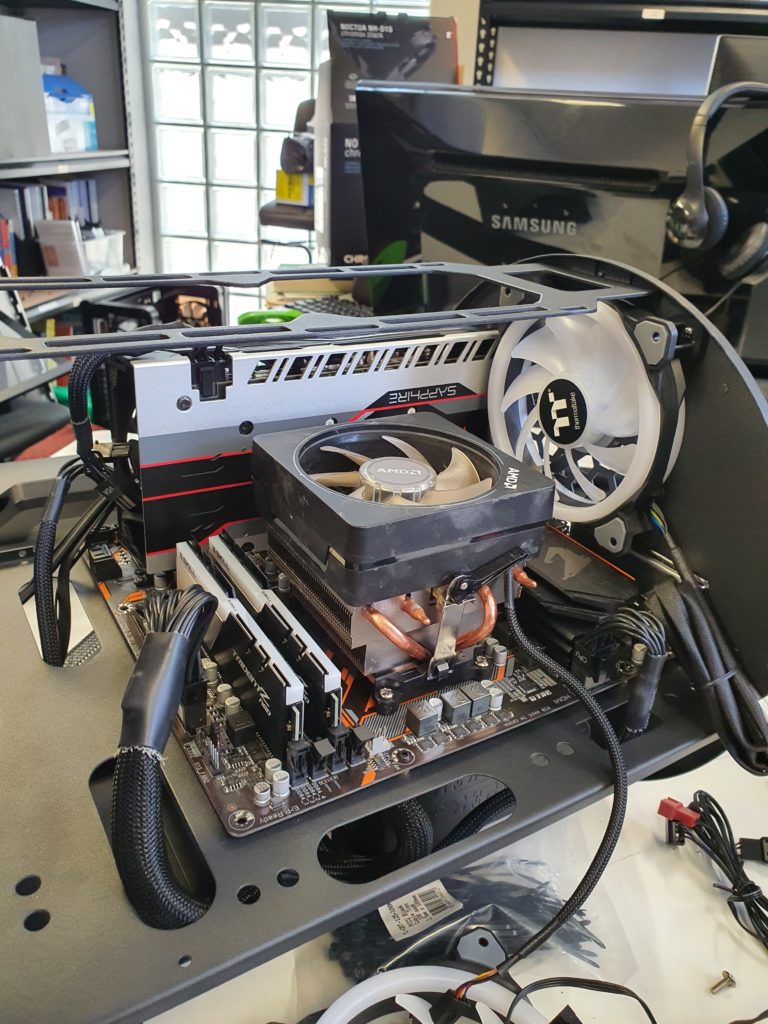
I put two ThermalTake Riing Trios on the top, sans radiator. An exhaust design wouldn’t have made sense given the downdraft fan two inches underneath them, so I turned them into intakes blowing additional air into the case. The Genki thingo has slots cut into the side so that air can escape. The third Riing Trio went on the back.
Here we were:
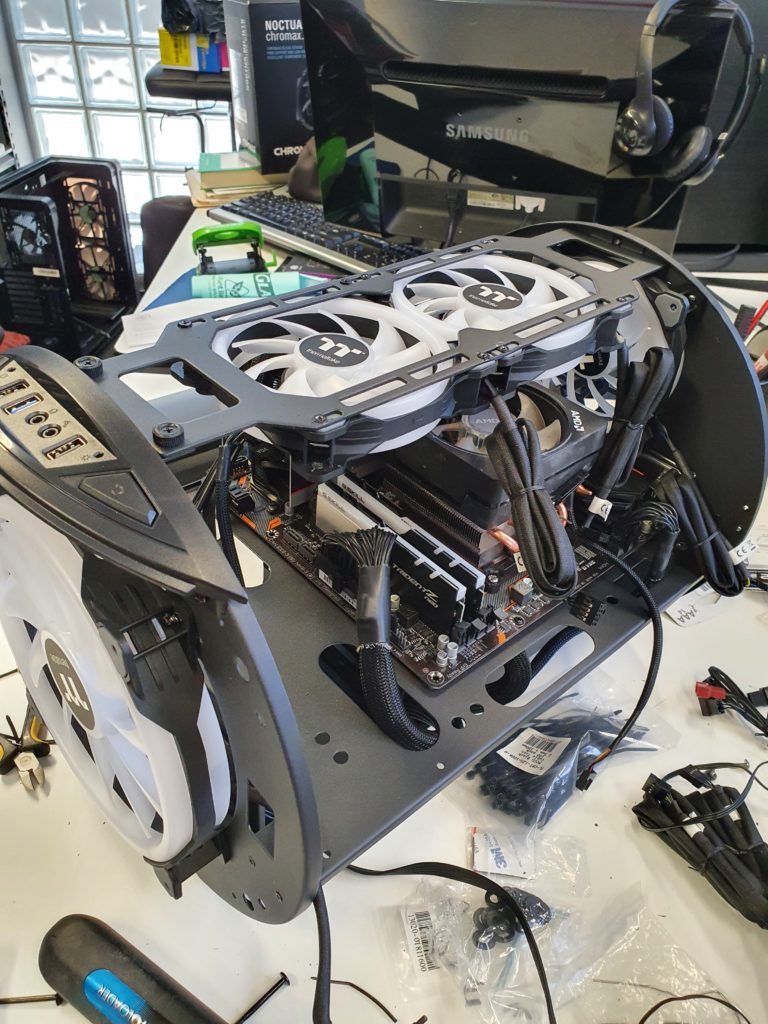
Note the scratched paint on the fan bracket. I was already running out of patience, and slapping things together.
Next, I took the fan cables and very carefully escorted them down into the basement of the case, using zipties to keep them tight. That’s not the only way to combine basements and zipties.

Notice the empty cavity where my hard drives are supposed to go. I have no external HDs, NVME makes them obsolete. I’m reclaiming the space to store cables and other crap.
I turned the computer on and it POSTed. By this point, we were 95% done. I just had to connect the fan cables into the included Thermaltake controller. What could go wrong with such a simple procedure?
I plugged my 20mm fan into port 1 and 2 (it uses two!), my three Riing Trios into ports 3, 4, and 5, and turned the PC on.
The fans didn’t spin. I assumed that there was some driver issue with the controller and USB link into the motherboard…but my computer identified that there was a controller attached. The fans just wasn’t receiving any power. Curious.
I tried several different things (different fans, different motherboard headers, etc). Eventually, I discovered the culprit: Molex cables, and the fact that they are dogshit.
Molex is a cabling standard invented by a company from the 30s that used to make flower pots (I’m not kidding. Look it up.). Although they technically carry more power than the competing SATA standard, they are far easier to break, as they rely on just four crimped or soldered points of failure. I don’t know why Thermaltake expects me to power any device in 2021 with Molex. Probably someone has a spreadsheet showing that updating to SATA power would drop their MMR by 0.4% this quarter and cause the planet to explode and Hitler to come back to life. I don’t know.
Here’s what happened: the female Molex on my PSU had slightly bent pins.

When I plugged the controller in, the misaligned rings failed to accept the +5v and +12v metal prongs, and literally pushed them out of their housing. I destroyed two Molex cables by plugging them in!
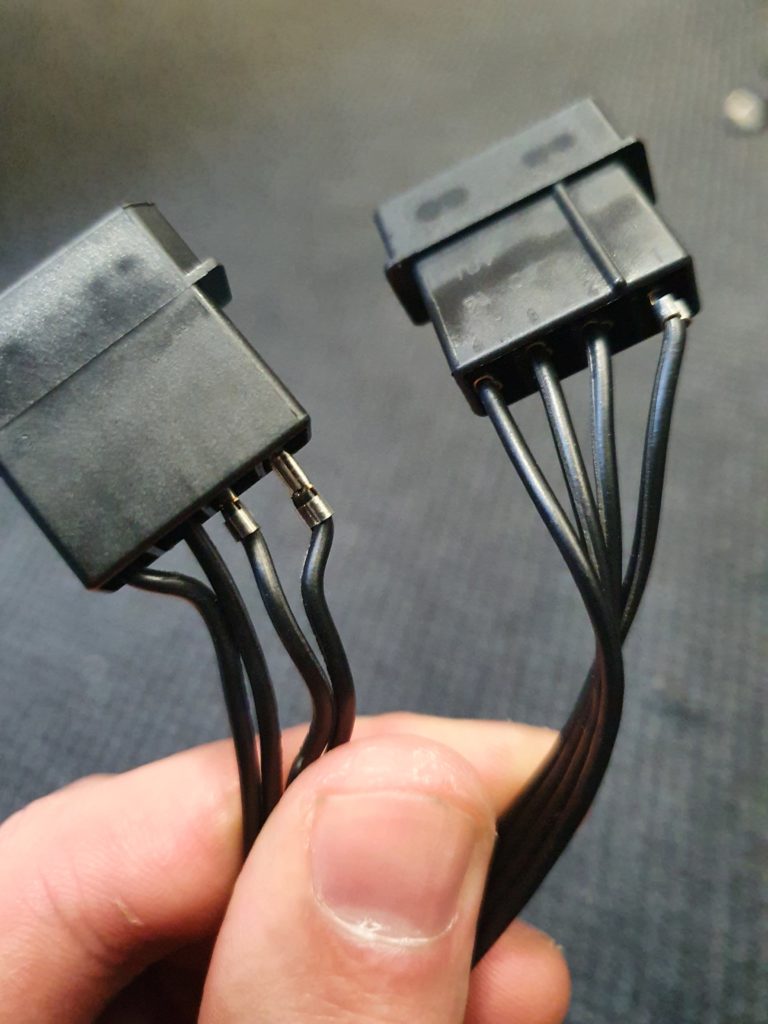
This wasn’t good. I could only use my fans if the controllers had power. And the controllers no longer had a way of receiving power.
Lacking a crimping kit and also lacking tolerance, I did the laziest and most dangerous thing possible: I pulled all of the prongs out of my ruined Molex housing, wrapped them in 400v electrical tape, and shoved them individually into the female Molex.
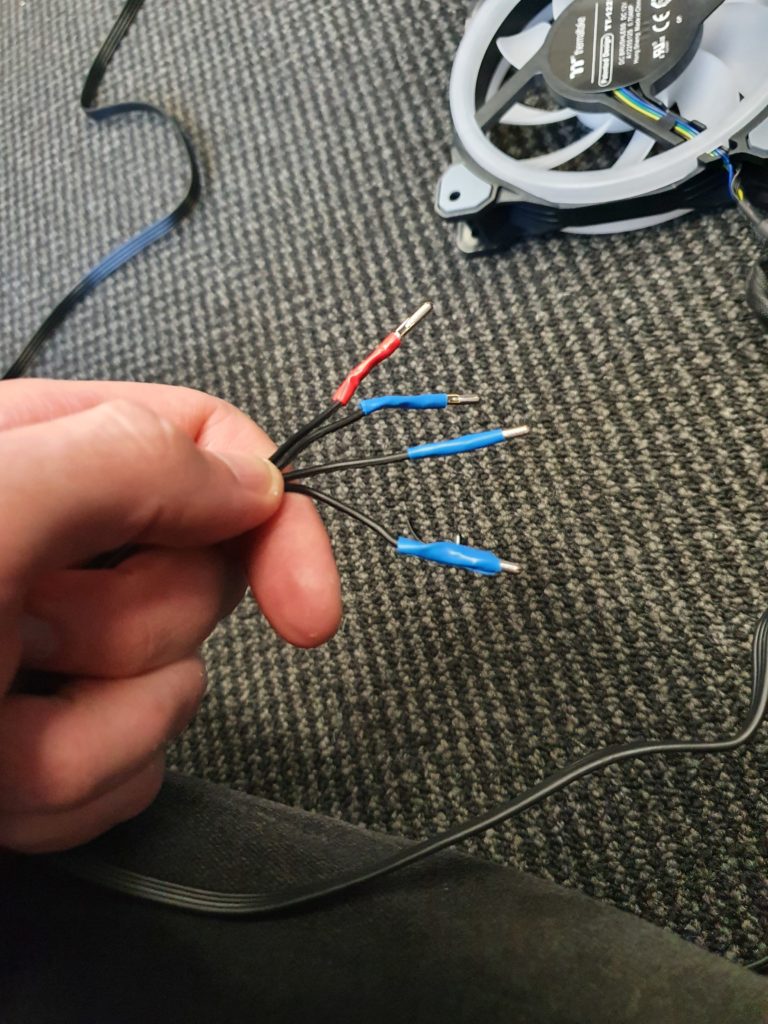
This seemed to work.

I stuck both my controllers (each set of Riing Trio Plus fans came with one) together with double-sided tape, and stored them directly next to the motherboard. This wasn’t my original plan, but if anything explodes or catches fire thanks to my disastrous solution, at least I’ll be the first to know about it. I might fix this long term. Or I might continue to do nothing.

Everything is now ready to go, and I’m typing using this machine now.


It has unimpressive specs, high noise, high heat, and has a questionable upgrade path. I like it a lot.
With builds, my goal is generally to equal or surpass the test build they used to advertise it. I think I did it with this one. Notice how they have an ugly run of cabling over the exhaust fan? Not on mine.

The case’s name has probably changed six times since I wrote this, so I think I’ll give it one of my own: POLYPHEMUS.
“He [Odysseus] then sailed for the land of the Kyklopes (Cyclopes), and put to shore. He left the other ships at the neighbouring island, took one in to the land of the Kyklopes, and went ashore with twelve companions. Not far from the sea was a cave, which he entered with a flask of wine given him by Maron. It was the cave of a son of Poseidon and a nymphe named Thoosa, an enormous man-eating wild man named Polyphemos (Polyphemus), who had one eye in his forehead. When they had made a fire and sacrificed some kids, they sat down to dine; but the Kyklops (Cyclops) came, and, after driving his flock inside, he barred the entrance with a great rock. When he saw the men, he ate some.
Odysseus gave him some of Maron’s wine to drink. He drank and demanded more, and after drinking that, asked Odysseus his name. When Odysseus said that he was called Nobody, the Kyklops promised that he would eat Nobody last, after the others: this was his act of friendship in return for the wine. The wine them put him to sleep.
Odysseus found a club lying in the cave, which with the help of four comrades he sharpened to a point; he then heated it in the fire and blinded the Kyklops. Polyphemos cried out for help to the neighbouring Kyklopes, who came and asked who was injuring him. When he replied ‘Nobody!’ they assumed he meant no one was hurting him, so they went away again. As the flock went out as usual to forage for food, he opened the cave and stood at the entrance with his arms spread out, and he groped at the sheep with his hands. But Odysseus bound three rams together . . . Hiding himself under the belly of the largest one, he rode out with the flock. Then he untied his comrades from the sheep, drove the flock to the ship, and as they were sailing off he shouted to the Kyklops that it was Odysseus who had escaped through his fingers.
The Kyklops had received a prophecy from a seer that he would be blinded by Odysseus, and when he now heard the name, he tore loose rocks which he hurled into the sea, just missing the ship. And from that time forward Poseidon was angry at Odysseus.”
The gematric and symbolistic parallelism of the tale is hard to ignore. I am Odysseus. Wine represents time: the computer drank all I could give it, and still demanded more. Fire represents electricity: it attracted the giant, but eventually destroyed the giant. I grew tired of the beast’s threats, hardened a spear in the flame, and drove it directly into the 200mm cyclops eye, “blinding it” by destroying the Molex controller cable.
Like Odysseus, I then engineered an embarassing but effective solution to escaping the blinded beast’s clutches. I am now sailing away, and although the beast throws rocks, I will surely prevail.
Polyphemus is a Romanisation of the Ancient Greek Πολύφημος (Polúphēmos). More specifically, πολύ (polú) + φήμη (phḗmē) + -ος (-os), literally “many-voiced”, “much spoken of”. This could be broadly interpreted as “many-titled”, or a reference to the fact that it has so many different names.
This case and I were destined to meet, just as I was destined to slay it. Poseidon’s angry with me, though. Not sure how I’ll get out of that one. But for now, I have Polyphemus.
No Comments »
In ’42, German forces advanced into Russia in the depths of winter. They were confident, thinking their foes weak and in retreat. They were about to be destroyed.
This was 1242, when a young Russian prince lured an army of Teutonic knights and Estonian auxiliaries onto the frozen surface of Lake Peipus and slaughtered them on the ice. Alexander Nevsky’s victory is remembered in Russia as Ледовое Побоище, or Icy Massacre, and might be history’s only naval battle to not involve a single boat. It ended the Teutonic Order’s pretensions upon Novgorodian territory and turned Nevsky into a national hero, sainted in 1547.
Heroes never die. Even when they pass away, something of their essence remains in the national heartwood, inspiring others through the centuries. Seven centuries after Nevsky died, history began to loop back on itself. A prisoner in Germany wrote a book about the future. He was ambitious; mad. He wanted Europe in flames, and a German empire atop the bones of a Russian one. Eight years later that man was both free from prison and Chancellor of Germany. Armies were gathering, and Russia needed heroes once again.
It was inevitable that a film about Alexander Nevsky’s life would be made: a Russian patriot fighting German Catholics was a perfect propaganda coup. Also, Nevsky had died a very long time ago, and we don’t know much about him as a person. This allowed a director freedom to “interpret” him as whoever they wanted, as well as freeing him from troublesome contemporary politics (unlike the Russian generals who had fought Napoleon…on the side of the tsar).
Alexander Nevski was directed by Sergei Eisenstein, with many asterisks and scare-quotes around “directed”. Soviet culture regarded artists as civil servants; if you could write a poem or paint a picture you were expected to do so for the state (and under the state’s supervision). Eisenstein was regarded as suspect when he made the film: he’d spent years living in the west, only returning after what appears to be blackmail. His previous film Bezhin Meadow had failed and earned him a public reprimand. His friends were being arrested, and he soon suspected that the NKVD was shadowing him. Eisenstein probably saw Alexander Nevsky as his last chance, and resolved not to put a single foot wrong. It’s debatable to what extent it’s “his” movie.
It was filmed in 1938 and produced by Mosfilm, with the final cut receiving some additional tinkering by the Party. You could almost give Joseph Stalin an editing and production credit. The picture gained final approval from the State Committee for Cinematography and was released on December 1938, although it hit a snag when when the Molotov-Ribbentrop Pact turned Russia and Germany into momentary allies. Ultimately it was a success, rescuing Eisenstein’s reputation and gaining him a new following abroad. It’s a huge, huge film. Irrefutably part of the canon.
But is it good? Difficult question. As journalist Chet Flippo said after seeing a Queen concert, it “got the job done. I’m just not sure what the job is.”
As a movie it’s a disappointment, featuring rancid acting, a dull story, and sententious touches (medieval Teutons that wear swastikas) that turn its historical setting into chopped liver.
It’s a relic from a bygone age when film was theater’s little brother: get ready for ponderous cinematography, pounding melodrama, shouty brow-furrowing performances, and a total lack of subtlety. Your enjoyment of Alexander Nevski depends on whether you think shots like this are dramatic or silly.
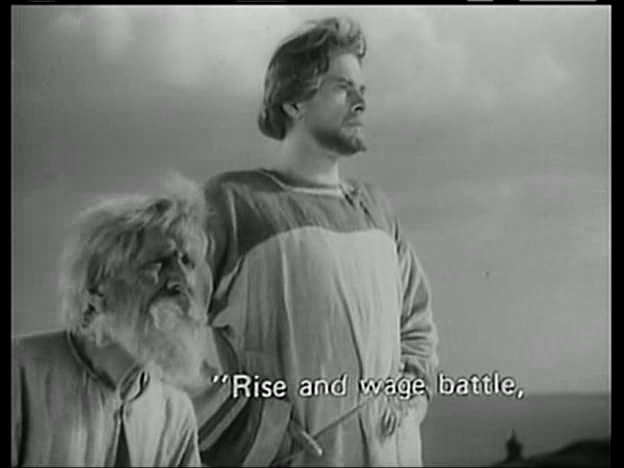
Nevsky is played by Nikolay Cherkasov, whose impression of a wooden board is second to none. His acting skills are suffocated by the role he’s playing: he’s Alexander Nevsky, Great Hero of the Motherland. He doesn’t have a love interest because his love is Russia, he can’t show weakness because Russia has no weaknesses, he can’t fart because that would be like Russia itself farting, etc…
Sergei Prokofiev’s score is acclaimed but I didn’t enjoy it: its shifts from movement to movement (with wildly different moods) sound weird and inorganic next to modern film scores. It’s probably great. I just can’t find a way into it. The subtitled dialog contains deathless Yoda-esque lines such as “They are strong! Hard will it be to fight them!” that hopefully flow better in the original Russian.
Eisenstein (as noted by Roger Ebert) sometimes made films that ascended directly to “great” without actually being good. Alexander Nevsky feels like that sort of movie: it has a spot on the film school curriculum but maybe not in the hearts of many students. It’s a 50 foot colossus with a clown shoes and a big red nose. Huge, important, towering above the landscape…but at the same time, it’s hard to take seriously.
In short, it’s a film of its time. In nearly every scene, shot, and frame, there’s something that jolts me out of the picture. The film at its best is a 1930s version of James Cameron’s Titanic, lavish and expensive, carrying the heft of history, with some innovative and somewhat impressive filmmaking techniques all built around a massive effects-driven set piece. At its worst, it’s patently absurd and laughable.
That’s one way of looking at Alexander Nevsky. The other is as a source of patriotic hope.
The darkness in the West hangs over all of this. You have to remember the circumstances of its production, who would have wanted to see it, and why. Many of Alexander Nevsky’s apparent flaws disappear when you watch it the way you’d listen to a national anthem as a patriot, or attend a church service as a believer.
The broad characterization and black-and-white morality are like anchors, points of stability in an unstable world. The Teutonic Knights are vile (there’s a horrible scene involving infants being thrown into a fire), but so were the real life Nazis. The film runs highlighter over Russian pride and German evil, relating everything back to the USSR’s contemporary circumstances. The historical garb is thinner than rice paper. I don’t think it was meant to be judged as a movie.
Even the film’s camp moments are interesting. At the start we see a Mongol chieftain offering Nevsky a command position in the Golden Horde (which is declined). He’s a silly fat man with a top-knot that looks like Mickey Mouse’s ears.
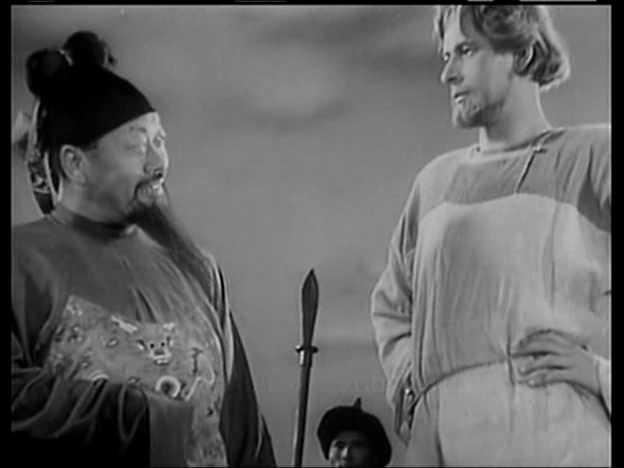
I am no expert, but I can’t find a photo of a traditional Mongolian (or Chinese) hairstyle that looks like that. It seems unique to the film. I half suspect we’re supposed to think of Mickey Mouse’s ears – the black cap contrasting with his pale skin completes the image. Mickey Mouse (like Alexander Nevski) is inseparable from one particular country: the United States.
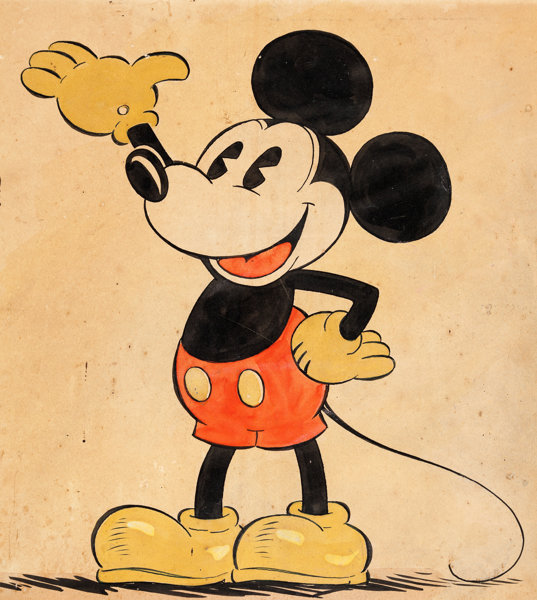
Does the Mongol Mouse represent capitalist America in the film? Just as Nevsky represents Russia? That would explain the ominous dialog where Nevski says that although the Mongols are a threat, the Germans are worse and must be fought first. “The Mongols can wait, methinks. We face more dangerous foes.” The difference, Nevsky goes on to explain, is that Mongols are greedy and can be placated with gifts (like capitalists), while the Germans are evil, destroying all that isn’t them (fascists). This anti-fascist angle, it must be said, now looks odd in light of how the Mongols are depicted as grubby savages, while Cherkasov is a tall, blond Aryan superman.
The rest of the film features more blatant pro-Soviet propaganda. Nevsky butts heads with with wealthy boyars (representing kulaks) and priests (representing…) who don’t understand the danger, want to appease the enemy, etc. Fortunately, Nevsky has the people on his side.
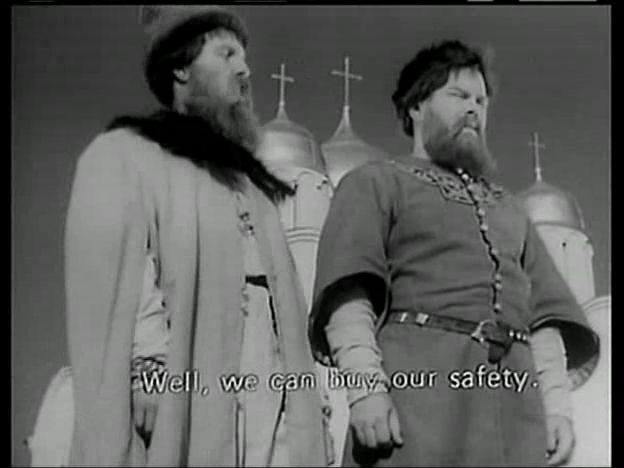
This isn’t even pseudo-history, it’s fan-fiction, like a teenage girl making Harry and Draco kiss. The real Alexander Nevsky was a rich aristocrat who took monastic vows. He wasn’t any kind of rabble-rousing working class hero (let alone an anti-capitalist or anti-clericalist). This is Russia’s 1930s political milieu projected seven hundred years into the past. But this is like noticing that Americans depict Jesus as white: it misses the point. Alexander Nevsky isn’t supposed to depict history except in a superficial way. It’s doing something more elemental, issuing marching orders to a nation.
What about the battle scene?
The final third of the movie is eaten up by an extremely long battle involving elaborate staging and hundreds of extras. The rest of the movie seems draped across this set-piece like a threadbare set of clothes (again, Titanic). When the horns blare and the massed columns of infantry advance onto the ice, you forget about everything that happened before. It’s its own self-contained universe.
The scene is groundbreaking – literally groundbreaking, it ends with an army falling through Lake Peipus – and ranks among the most thrilling moments yet seen in a movie. How did it take just forty years to go from Fred Ott’s Sneeze to this? Even today, the battle looks fairly good. Almost any time you see a motion picture featuring a cavalry charge – be it Peter Jackson’s Lord of the Rings, Mel Gibson’s Braveheart, or Sergey Bondarchuk’s Waterloo – it’s trying to look like Alexander Nevsky, consciously or otherwise.
Yes, you can sort of tell that the actors are being filmed under a bright sun on a hot day, but in black and white it’s not obvious. Films have something called “day for night” (a “night scene” that’s clearly not at night). Alexander Nevski went one further: hot for cold. Sand is used in place of snow. Huge sheets of broken glass are used in place of ice. The incredible thing is that it works.
It must have taken a staggering amount of money to film the battle. The costumes, props, and so forth look perfect, and there are hundreds of them. Within a few years, Russians would be facing the Germans with empty rifles, tanks without radios, etc. There’s a grim irony to the fact that (based on the opening weeks of Operation Barbarossa) the USSR was better at fighting a fake war than a real one.
It has some dated elements. Eisenstein wasn’t able to capture the violence and kinematics of an actual battle. Blows are half-hearted. People fall over dead for no reason. Horses are perfectly calm where they should be white eyed, terrified, and spraying foam.
This moment made me laugh. It was like a Keystone Kops gag.
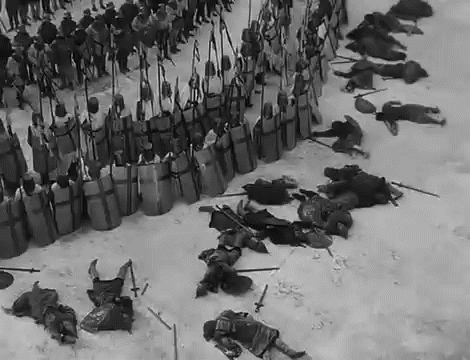
The sheer length of the battle wore me down. Just shot after endless shot of men swinging swords at enemies conspicuously out of frame. I’ll admit that after twenty minutes of this, I wasn’t overjoyed by the prospect of twenty more.
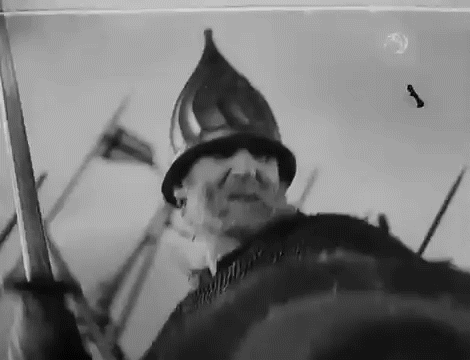
However, the battle ends on an striking visual: the beleaguered Germans collapse the ice with their weight and drown. This is apparently fiction – no contemporary accounts describe such an event – but it’s good, effective filmmaking, breaking the tedium of the battle and providing effective closure to the ice scene. It’s Chekov’s gun in the end. Put a gun on the set, and it has to get used. Put an army on a a frozen lake, and they have to fall through.
Many nations have legends of sleeping champions (Portugal’s King Sebastian, Britain’s King Arthur, Germany’s Frederick Barbarossa) who will return to fight for their homeland in its hour of need. But the atheistic USSR didn’t believe in such fairytales. They forced Nevsky back to life, through the magic of cinema. They probably thought they had to.
It’s a little hard to recommend the entire movie, although the battle is worth watching. Alexander Nevsky does not escape the time its in. You have to take it for what it is, a propaganda tool for a desperate nation facing desperate times. Seen with this in mind, it has a chilling power. Thunderclouds seem to hang above it. Walls of tanks clank in the background. Ahead lay a nightmare: a war so awful that historians disagree not just on how many Russians died, but how many million. The battle is inseparable from the mechanical savagery of Stalingrad and Kursk. The burning children reminds of the Holocaust.
Few films gain so much from their context, and few films have a context this awful. Alexander Nevsky is like a battle standard overlooking a battlefield. It’s just a crude image of a lion, fluttering in the wind. But underneath that lion are rivers of gore, shattered bones, smashed helmets and vambraces, cries of the wounded, and feasting crows.
No Comments »





















